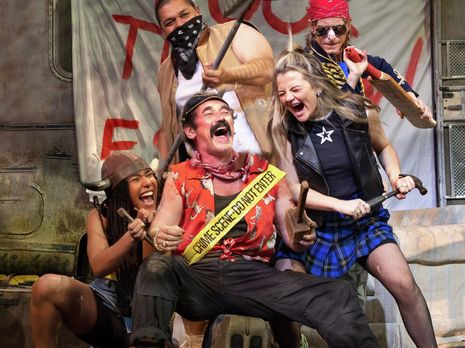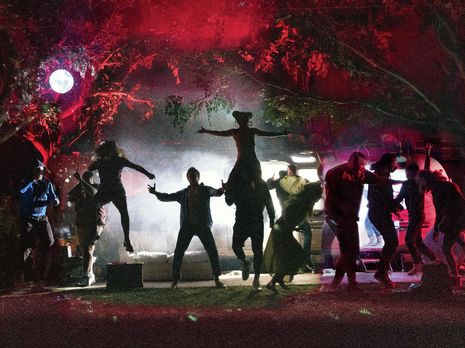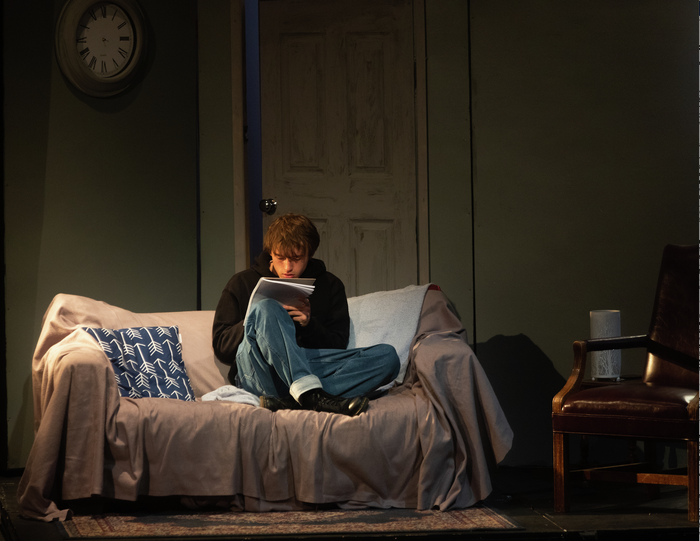Jerusalem: an English myth
Tom Howlett reviews Jerusalem at the Apollo Theatre

In the collection of myths and legends that make up large parts of English history, there are two figures. One stands tall, proud, emblazoned in gold and beautifully scarred. King Arthur presides over all as a symbol of the chivalric past, a past where valour coats brutality and nobility shadows autocracy. But there is also a figure beside him, one mottled in green, appearing to have been hewn out of the very earth.
“[Rooster’s] vast shadow is a refuge for all the outcasts, burnouts and misunderstood”
This figure does not, as Arthur does, stand at the forefront of our cultural consciousness but instead lurks in the corners, the shadows, and the gaps in between. His vast shadow is a refuge for all the outcasts, burnouts and misunderstood. Jez Butterworth’s Jerusalem takes this figure and peels away the overgrowth to reveal a spliff held in the lips, a rooster tattoo on the arm and an eye that holds within it the history of all the unnamed outlaws, drifters and renegades that have travelled ‘England’s mountains green.’ Jez Butterworth reveals Jonny ‘Rooster’ Byron.
Jerusalem was first performed at the Royal Court Theatre in 2009 and was instantly considered one of the greatest plays of the 21st century. In 2022 it returns to the Apollo Theatre – into a world much changed in its absence and ready to embrace its mythic majesty. The play opens upon the same gunmetal grey caravan, Mark Rylance as the same, awe-inspiring, terrifying Jonny Byron and the same script, unmatched, since its release, in wit and poignancy.
Jerusalem often poses the question of Jonny Byron’s constancy. Even asking him once, directly, how ‘the world turns. And it turns. And … you’re still here.’ To this, I have no answer, other than the fact that Mark Rylance is a force of nature and, even at 62, is able to give a performance of such staggering physicality and power that you question if it isn’t still 2009 and that we need Jonny ‘Rooster’ Byron now more than ever.

Every superlative and adjective has already been used to describe Jerusalem and it is, still, hilarious, tender, crude, frightening and all of the hundreds of words that have been used to desperately define its ineffable genus. But it is also timely, it seems strange to say about a play that was written thirteen years ago, by Jonney ‘Rooster’ Byron, the symbol for the displaced, the cast out and the misunderstood, is as pertinent as ever.
“[Jerusalem] captures a spirit of Englishness in a complicated melting pot of c words and Shakespearean allusions”
Rylance’s Jonny ‘Rooster’ is one of the great theatrical performances. From his puffed out chest, bowed legs and cockeyed stare he embodies his character’s namesake and excludes a powerful, menacing charisma that both attracts and repels you in equal measure. But, despite his sheer brilliance, he does not overshadow the rest of the cast, Mackenzie Crook, reprising his role as Ginger is reliably, amusingly pathetic and loyal, Gerald Horan’s Weasley jovial, affable and exceptionally funny. The young group or ‘rats’, as Jonny calls them, bring a vitality and reliability to the play. Each member of this ensemble draws out different parts of the quintessential adolescent experience, from Lee’s pursuit of something greater to Tanay’s unrequited attraction or Daviey’s sophisticated complacency.
The play is written in a charming equilibrium between crudity and elegance. It captures a spirit of Englishness in a complicated melting pot of c words and Shakespearean allusions. It is both ode and elegy to the mythic history of Britain, in which the folk stories of giants, werewolves, fairies and curses are forced into combat, both literally and metaphorically, by the banal, provincial bureaucracy of Kennet and Avon Council.
The stage setting functions as a perfect representation of the majesty, beauty and power that the play places on the natural world. The trees pierce through the sky letting through rays of ethereal light which filter, in dappled streams, down to the characters below. The large metal caravan is a representation of Jonny himself, bruised, scarred, dented and yet gleaming. Its total stationariness but capacity to move also represents Jonney’s: both eternally present but inevitably transient.
Jerusalem is a play full of outcasts, those who don’t fit or don’t want to fit and has become one of the most established contemporary plays of the last twenty years. Yet, despite the praise, despite the place Jerusalem has carved itself in the literary canon, for the three hours I sat in the Apollo Theatre I saw the half-space, the refuge for the lost, beleaguered and unwanted. Our English history is a muddied, dark, disturbing mess of malapportioned reverence and undue faith but, inside its shadowy depths there lies a figure that represents something to be admired. So if we are to sing Jerusalem to praise Albion, let us not think of Arthur but instead scream the name Jonny ‘Rooster’ Byron.
Jerusalem by Jez Butterworth is on at the Apollo Theatre London until the 7th of August
 Comment / College rivalry should not become college snobbery30 January 2026
Comment / College rivalry should not become college snobbery30 January 2026 Features / Are you more yourself at Cambridge or away from it? 27 January 2026
Features / Are you more yourself at Cambridge or away from it? 27 January 2026 Science / Meet the Cambridge physicist who advocates for the humanities30 January 2026
Science / Meet the Cambridge physicist who advocates for the humanities30 January 2026 News / Cambridge study to identify premature babies needing extra educational support before school29 January 2026
News / Cambridge study to identify premature babies needing extra educational support before school29 January 2026 News / Vigil held for tenth anniversary of PhD student’s death28 January 2026
News / Vigil held for tenth anniversary of PhD student’s death28 January 2026











